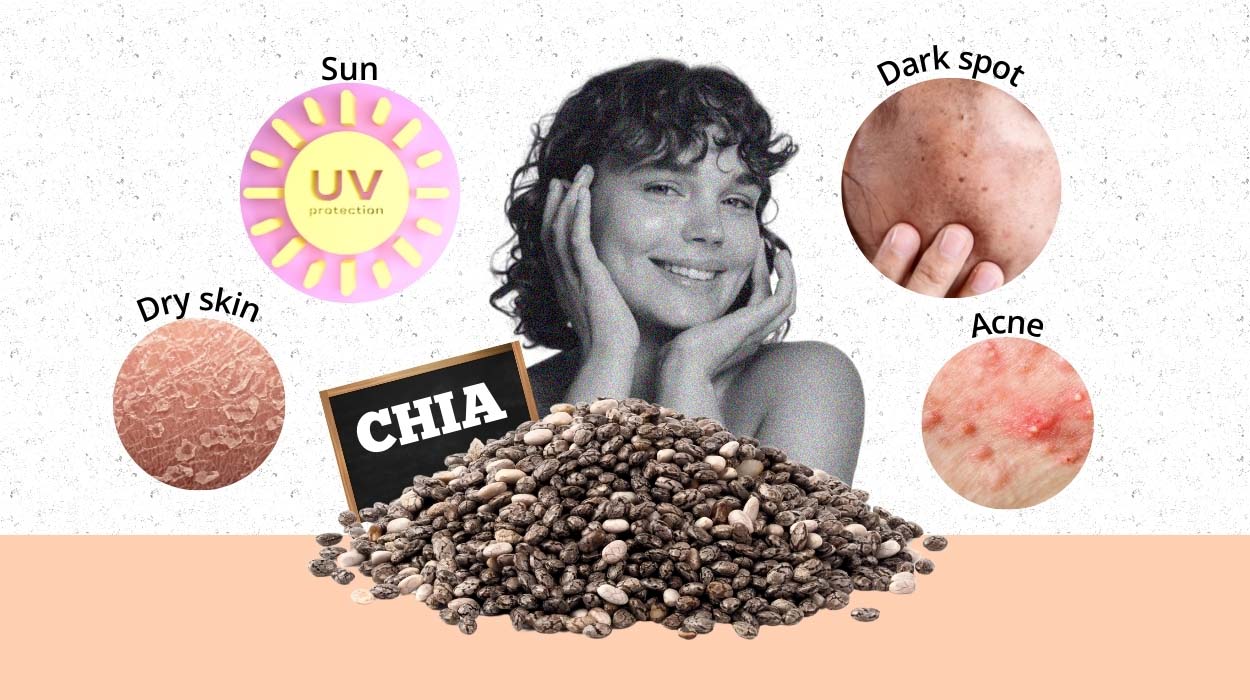 Expert's opinion
Expert's opinion
Expert's opinion
The article is a subjective view on this topic written by writers specializing in medical writing.
It may reflect on a personal journey surrounding struggles with an illness or medical condition, involve product comparisons, diet considerations, or other health-related opinions.
Although the view is entirely that of the writer, it is based on academic experiences and scientific research they have conducted; it is fact-checked by a team of degreed medical experts, and validated by sources attached to the article.
The numbers in parenthesis (1,2,3) will take you to clickable links to related scientific papers.
Chia Seeds Benefits For Skin 2024: Top 5 You Might Not Know

Chia seeds, the tiny grey-colored seeds from a plant in the mint family, have been recognized as a potent superfood. Not only are they bursting with a remarkable range of vital nutrients, but they are also widely acclaimed for their many health benefits, including weight management, heart health, and skin and hair health.
This article explores the benefits of chia seeds for maintaining skin health, providing practical ways to incorporate them into your diet and skincare routine.
Benefits Of Chia Seeds For Skin
Chia seeds are packed with omega fatty acids, essential amino acids, vitamins, antioxidants, and fiber. Not only does the ingestion of chia seeds significantly boost your daily intake of these essential nutrients, but topical applications also offer direct skin benefits. By working these little seeds into your diet and skincare routine, you can improve:
- Dry Skin
- Aging
- Acne
- Dark Spots
- Sun Exposure
The Top 5 Chia Seeds Benefits For Skin

The nutritional profile of chia seeds makes skin healthy. Here are the top 5 skin benefits of chia seeds:
Hydration
Chia seeds contain a high concentration of omega-3 fatty acids, which are known for their ability to lock in moisture and keep the skin hydrated. Omega fatty acids act as a natural barrier[1], helping to prevent dry skin by sealing in moisture. Both[2] eating chia seeds and applying extracts or whole seeds to the skin are ways you can harness these characteristics.
Anti-Aging
The antioxidants present in chia seeds help protect the skin[3] from damage caused by sun exposure and pollution. Antioxidants, along with the amino acids in chia seeds, support collagen production[4], maintaining skin elasticity, and helping to reduce fine lines and wrinkles.
Acne Reduction
The anti-inflammatory properties of chia seeds can help reduce skin inflammation, a key factor in conditions like acne[5]. Additionally, their omega-3 fatty acids[6] may help combat acne-causing bacteria, resulting in a clearer complexion. Working them into your diet is the simplest way to use them, but chia seed oils are effective components of natural, vegan skincare products.
Clear Dead Skin Cells & Dark Spots
Chia seeds, when used in skincare products like scrubs and masks, can act as a natural exfoliant[7], removing dead cells and revealing a fresh layer of skin underneath. This can help reduce the appearance of dark spots and give your skin a healthier glow.
UV Protection
Chia seeds are packed with antioxidants that protect the skin[8] from damage caused by UV radiation. Consuming them is not a replacement for sunscreen but can provide additional protection against harmful sun rays. Some animal studies suggest anti-cancer properties[9].
Incorporating chia seeds into your diet and skincare routine can improve skin health and appearance. Their fatty acids, antioxidants, and other nutrients can contribute to a naturally radiant glow and healthier skin!
Nutritional Value Of Chia Seeds For Skin

A Closer Look at Chia Seeds’ Nutritional Profile
Chia seeds are packed with essential nutrients that can dramatically enhance skin health. Here is a breakdown of the nutrients that make chia seeds so beneficial for skin health:
- Omega Fatty Acids: Chia seeds are a rich source of fatty acids, particularly omega-3 fatty acids. They consist of up to 60% omega-3 fatty acids, notably alpha-linolenic acid (ALA), essential for maintaining skin health[10].
- Essential Amino Acids: These tiny seeds are a complete protein source[11], offering all nine essential amino acids.
- Vitamins: Chia seeds are a good source of several essential vitamins beneficial for skin health, including Vitamin E and Vitamin C[12].
- Antioxidants: Chia seeds are abundant in antioxidants[13], which protect your skin from free radical damage, reducing your risk of cancer and other illnesses.
- Fiber: Chia seeds are also high in fiber, promoting a healthy digestive system. A healthy gut is essential for healthy skin.
How Chia Seeds Contribute To Your Daily Nutritional Needs
Eating chia seeds can provide a high dose of healthy fats, fiber, and antioxidants that can promote healthy skin, aid in weight loss, support heart health, and help regulate blood sugar levels. Chia seeds are a nutritional powerhouse, which makes them a valuable addition to any diet aiming for healthier skin and overall wellness.
When you eat chia seeds regularly, they can contribute significantly to your daily nutritional needs. Just one ounce (approximately two tablespoons) provides 9.75 grams of fiber, 4.68 grams of protein, 8.7 grams of fat, and many vitamins and minerals[14].
How Do You Use Chia Seeds To Get Glowing Skin?
Chia seeds offer a range of benefits that can boost skin luminosity. Here are some effective ways to use chia seeds for skin:
Incorporating Chia Seeds Into Your Diet
The simplest way to use chia seeds is to eat them. Incorporating chia seeds into your diet is straightforward, thanks to their mild texture and flavor. Add them to your breakfast cereal, yogurt, salads, or smoothies to reap the health benefits. They are also one of the best foods high in omega-3.
As a bonus, the fiber in chia seeds can help support a healthy gut, indirectly contributing to healthier skin. Plus, if weight management is on your agenda, you might want to check out our article on chia seeds for weight loss.
Creating A Chia Seed Face Mask
Using chia seeds topically can provide direct benefits to your skin. One way to do this is to soak chia seeds to make a face mask.
Here’s a simple recipe:
- Soak 1 tablespoon of chia seeds in 3 tablespoons of water for about 20 minutes until it forms a gel.
- Mix this gel with 1 tablespoon of coconut oil and 1 tablespoon of lemon juice.
- Apply the mask to your face, leave it on for about 15-20 minutes, then rinse off with warm water.
This face mask can help moisturize your skin, remove dead skin cells, reduce inflammation, and lighten dark spots.
Using Chia Seed Oil In Your Skin Routine
Chia seed oil is another excellent way to harness the skin benefits of chia seeds. Its high omega-3 content helps hydrate the skin, reduce inflammation, and smooth fine lines. You can use chia seed oil directly on your skin or add a few drops to your favorite moisturizer.
Skin-Friendly Seeds: Alternatives To Chia Seeds
A Nutritional Comparison
Flax seeds are another popular choice in the world of superfoods for skin. Like chia seeds, flax seeds[15] are rich in omega-3 fatty acids. However, they also contain lignans, potent antioxidants that help fight free radical damage.
For those following a plant-based diet, both chia and flax seeds could be part of the best vegan omega-3 supplement routine.
The Benefits Of Pumpkin Seeds for Your Skin
Pumpkin seeds[16] are another skin-friendly alternative. They are rich in zinc, which helps maintain skin health, fight acne, and reduce inflammation. Pumpkin seeds are also an excellent source of selenium, an antioxidant that protects the skin from damage.
To optimize your skin health, consider trying out a mix of these seeds in your diet and skincare routine. A good place to start might be this Care/of Vitamins review, which touches on their plant-based options.
Conclusion
Chia seeds, along with their alternatives flax and pumpkin seeds, serve as nature’s solutions to a range of skin issues. Their nutrient-rich profile supports skin hydration, reduces skin inflammation, and enhances the skin’s natural barrier, making chia seeds an excellent addition to your skincare routine, especially for those with sensitive skin.
Whether you consume them as part of your diet or use them topically in the form of masks or oils, regularly using chia seeds can make a notable difference. Combining them with a good skin care regimen and a balanced diet can combat various skin irritations and promote healthier, radiant skin. Remember, radiant skin and healthy hair reflect your body’s overall health and wellness.
Frequently Asked Questions
Absolutely! Chia seeds, rich in omega fatty acids, vitamins, and antioxidants, nourish your skin from within and contribute to a healthy skin glow. Incorporating them into your diet and skincare routine can improve skin hydration, reduce inflammation, and a healthier complexion.
Chia seeds contain essential amino acids and antioxidants that support collagen production. Regular intake can help maintain skin elasticity and reduce the appearance of fine lines and wrinkles, contributing to a more youthful look.
While more research is needed, chia seeds could potentially support hair growth due to their high protein content, vital for strengthening hair fibers. Applying a hair mask made from chia seeds soaked in aloe vera gel or olive oil could nourish the scalp and promote healthier hair.
Daily intake of chia seeds can provide a range of health benefits beyond skin glow. They are packed with fiber that supports a healthy digestive system, omega-3 fatty acids beneficial for heart health, and protein for muscle repair and growth. Regular consumption can also help in maintaining blood sugar levels and weight management.
Drinking chia seeds soaked in water every day can boost hydration, aid digestion, and provide a steady stream of energy. The gel-like consistency of soaked chia seeds acts as a natural cleanser, potentially aiding in flushing out toxins and supporting overall health.
Eating chia seeds can offer several benefits for your face. Their omega-3 fatty acids and antioxidants fight inflammation and free radical damage, which can reduce acne and dark spots. Additionally, they support skin hydration and elasticity, reducing skin irritation and contributing to a healthier complexion. Suitable for all skin types, chia seeds may help soothe itchy skin caused by dryness or sensitivity.
+ 16 sources
Health Canal avoids using tertiary references. We have strict sourcing guidelines and rely on peer-reviewed studies, academic researches from medical associations and institutions. To ensure the accuracy of articles in Health Canal, you can read more about the editorial process here
- Lin, T.-K., Zhong, L. and Santiago, J.G. (2017). Anti-Inflammatory and Skin Barrier Repair Effects of Topical Application of Some Plant Oils. [online] 19(1), pp.70–70. doi:https://doi.org/10.3390/ijms19010070.
- Motyka, S., Koc, K., Ekiert, H., Blicharska, E., Katarzyna Czarnek and Szopa, A. (2022). The Current State of Knowledge on Salvia hispanica and Salviae hispanicae semen (Chia Seeds). [online] 27(4), pp.1207–1207. doi:https://doi.org/10.3390/molecules27041207.
- Pham-Huy, L.A., He, H. and Pham-Huy, C. (2008). Free radicals, antioxidants in disease and health. International journal of biomedical science : IJBS, [online] 4(2), pp.89–96. Available at: https://www.ncbi.nlm.nih.gov/pmc/articles/PMC3614697/.
- Ruta Ganceviciene, Liakou, A.I., Theodoridis, A., Evgenia Makrantonaki and Zouboulis, C.C. (2012). Skin anti-aging strategies. [online] 4(3), pp.308–319. doi:https://doi.org/10.4161/derm.22804.
- Leyden, J.J., Stein-Gold, L. and Weiss, J.A. (2017). Why Topical Retinoids Are Mainstay of Therapy for Acne. [online] 7(3), pp.293–304. doi:https://doi.org/10.1007/s13555-017-0185-2.
- Huang, T.-H., Wang, P.-W., Yang, S.-C., Chou, W.-L. and Fang, J.-Y. (2018). Cosmetic and Therapeutic Applications of Fish Oil’s Fatty Acids on the Skin. [online] 16(8), pp.256–256. doi:https://doi.org/10.3390/md16080256.
- Binić, I., Lazarevic, V., Milanka Ljubenović, Jelena Mojsa and Dušan Sokolović (2013). Skin Ageing: Natural Weapons and Strategies. [online] 2013, pp.1–10. doi:https://doi.org/10.1155/2013/827248.
- Dini, I. and Laneri, S. (2021). The New Challenge of Green Cosmetics: Natural Food Ingredients for Cosmetic Formulations. [online] 26(13), pp.3921–3921. doi:https://doi.org/10.3390/molecules26133921.
- Parker, J.E., Schellenberger, A.N., Roe, A.L., Oketch-Rabah, H.A. and Calderón, Á.I. (2018). Therapeutic Perspectives on Chia Seed and Its Oil: A Review. Planta Medica, [online] 84(09/10), pp.606–612. doi:https://doi.org/10.1055/a-0586-4711.
- Ullah, R., Nadeem, M., Khalique, A., Imran, M., Mehmood, S., Javid, A. and Hussain, J. (2015). Nutritional and therapeutic perspectives of Chia (Salvia hispanica L.): a review. [online] 53(4), pp.1750–1758. doi:https://doi.org/10.1007/s13197-015-1967-0.
- Bartosz Kulczyński, Kobus-Cisowska, J., Maciej Taczanowski, Kmiecik, D. and Gramza-Michałowska, A. (2019). The Chemical Composition and Nutritional Value of Chia Seeds—Current State of Knowledge. [online] 11(6), pp.1242–1242. doi:https://doi.org/10.3390/nu11061242.
- Pullar, J.M., Carr, A.C. and Margreet C.M. Vissers (2017). The Roles of Vitamin C in Skin Health. [online] 9(8), pp.866–866. doi:https://doi.org/10.3390/nu9080866.
- Pham-Huy, L.A., He, H. and Pham-Huy, C. (2008). Free radicals, antioxidants in disease and health. International journal of biomedical science : IJBS, [online] 4(2), pp.89–96. Available at: https://www.ncbi.nlm.nih.gov/pmc/articles/PMC3614697/
- Usda.gov. (2023). FoodData Central. [online] Available at: https://fdc.nal.usda.gov/fdc-app.html#/food-details/170554/nutrients
- Priyanka Kajla, Sharma, A. and Sood, D.R. (2014). Flaxseed—a potential functional food source. [online] 52(4), pp.1857–1871. doi:https://doi.org/10.1007/s13197-014-1293-y.
- Adchara Prommaban, Ratthida Kuanchoom, Natthidaporn Seepuan and Wantida Chaiyana (2021). Evaluation of Fatty Acid Compositions, Antioxidant, and Pharmacological Activities of Pumpkin (Cucurbita moschata) Seed Oil from Aqueous Enzymatic Extraction. [online] 10(8), pp.1582–1582. doi:https://doi.org/10.3390/plants10081582.



